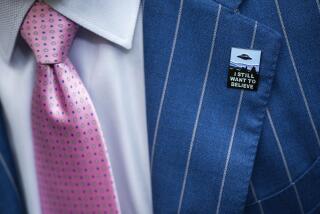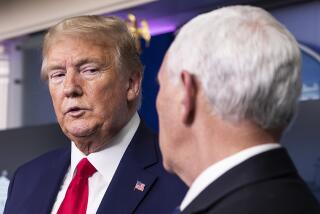Tip to S. Korean ‘Stupid,’ Derwinski Testifies
- Share via
WASHINGTON — Veterans Secretary-designate Edward J. Derwinski on Wednesday described as “rather stupid” his tipping off a South Korean political minister that a Korean CIA official was defecting to U.S. authorities, but told a Senate committee he did so without “malicious” intent.
Derwinski, testifying in detail publicly for the first time about the 1977 incident, appeared certain to win approval by the Senate Veterans Affairs Committee when it votes today on his nomination. But the panel’s hearing disclosed that conflicts exist between Derwinski’s current explanation of the incident and what he told FBI agents about it after it occurred.
Sen. Frank H. Murkowski (R-Alaska), the committee’s ranking minority member, made the sharpest reference to the conflict in citing Derwinski’s “seeming lack of directness” about the incident. Further, he advised him to tape record his answers the next time he talks to FBI agents.
Sees ‘Nothing Malicious’
But Sen. Arlen Specter (R-Pa.) seemed to be speaking for most committee members in telling Derwinski there was “nothing malicious or intentional to what you did.”
Specter said he had concluded that the tip to the South Korean official, “when contrasted with your long and otherwise unblemished, distinguished record” as a 12-term congressman and then State Department official, should not stand as a barrier to confirmation as the nation’s first secretary of veterans affairs.
Under questioning by Specter and Sen. Alan Cranston (D-Calif.), committee chairman, Derwinski said he still does not think his conversation with the South Korean official “endangered anyone . . . or obstructed justice in any way.” He said he did not know the name of the defecting intelligence agent, his rank or location.
Federal sources familiar with the incident, however, say that the defector and his family could have been harmed if the FBI had not escorted them to safety only half an hour before Korean CIA agents arrived at his home in the United States.
At the time of the incident, Derwinski was ranking Republican on a House subcommittee that was looking into allegations of influence peddling by South Korean agents. The subcommittee had opposed the so-called Koreagate investigation as damaging to U.S. security interests in South Korea.
In written responses to questions by Cranston and in testimony Wednesday, Derwinski said he mentioned the impending defection to the Korean Embassy official when he ran into him in front of a House office building.
He said he told the South Korean official, whose name he could not recall, that there was going to be “the added PR problem of the subcommittee’s receiving testimony” from a defector.
Derwinski said he was speaking to the official, whom he described as “political minister at the embassy,” in the “supercharged atmosphere involving anything Korean” and that in hindsight he should have never made the comment.
Derwinski’s tip became known to federal authorities through electronic monitoring of the South Korean Embassy that picked up a reference to his conversation with the Korean official, a source familiar with the matter said.
Conducts Closed Session
As a result of the security surrounding that monitoring and related classified matters, the Senate committee questioned Derwinski for 90 minutes Tuesday in a closed session held in a special “bug proof” room in the Capitol.
Wednesday’s testimony confirmed that Derwinski’s account of the incident now and the one he had given earlier to the FBI differed in some respects. However, those conflicts were not aired at the hearing and the nature of them could not be learned.
Derwinski sidestepped a question by Cranston on whether his leak had prompted intelligence agencies to refuse for six months to give the House subcommittee any more sensitive information for its probe.
Derwinski said he recalled working “to obtain a better flow of information relevant to the subcommittee’s investigation from federal agencies.”
The hearing disclosed that Atty. Gen. Dick Thornburgh declined to support a committee request for information from a federal grand jury that investigated the defector warning. The grand jury ended its inquiry without action on grounds that such action could reveal sensitive sources and intelligence methods.
Under questioning by Cranston, however, Derwinski said he had declined to answer the grand jury’s questions in 1977, citing the Constitution’s “speech and debate” clause as grounds for his refusal.
Cranston noted that a subsequent decision of the Supreme Court had narrowed use of that clause, which protects federal legislators from being held legally accountable for matters in connection with their speech or debate, and that it would no longer cover Derwinski’s refusal to testify.
Derwinski said it was not his “decision or strategy” not to testify, but that he had done so on the advice of his counsel, Thomas A. Kennelly.
More to Read
Get the L.A. Times Politics newsletter
Deeply reported insights into legislation, politics and policy from Sacramento, Washington and beyond. In your inbox twice per week.
You may occasionally receive promotional content from the Los Angeles Times.










